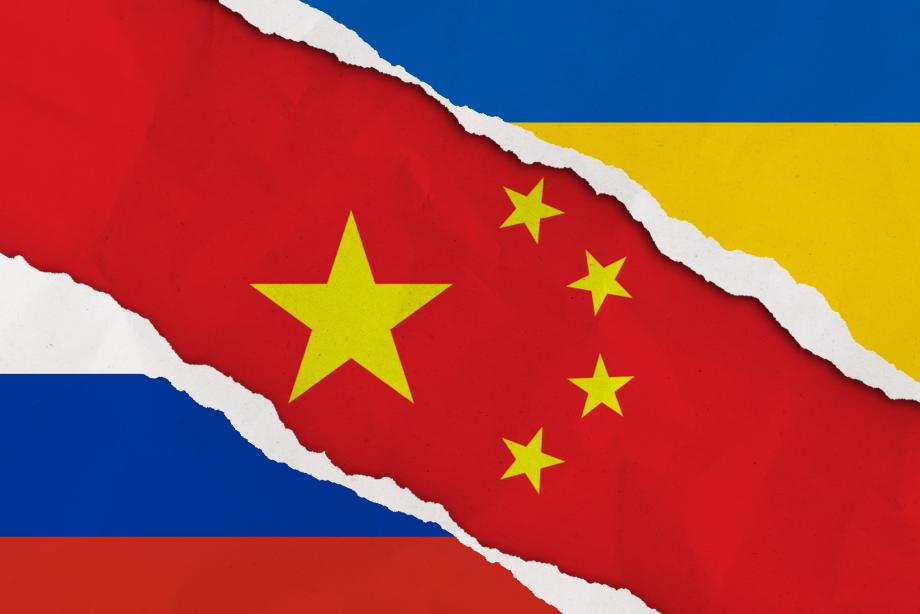What is China playing at? Beijing’s Difficult Navigation of Neutrality and Rivalry

One year after the outbreak of the full-scale Russian invasion of Ukraine, China re-emerged on the international stage. After a period of self-imposed isolation during the global pandemic, the country is now facing a weakened economy, brought about by the imposition of lockdowns, as well as underlying structural problems and American trade restrictions. As a result, its diplomatic attitude seems to have shifted to a less confrontational stance. Simultaneously, China has been increasingly open in supporting Russia and its objectives in opposition to Ukraine, the United States, and their allies.
China’s battle of influence in Europe
To signal its willingness to reconnect with the world, Beijing sent its top diplomat and former Foreign Minister, Wang Yi, on a tour of European nations. Starting in Paris, he travelled to Italy, Germany and Hungary, evaded Brussels, and ended in Moscow even as the war initiated by Russia’s invasion intensified. This tour sent a flurry of contradicting messages.
Wang indicated his objective was to “promote new developments in bilateral relations, enhance strategic mutual trust between China and Europe, and exchange views on major international issues.” While the visit of the three largest economies of the EU brings no real surprise, his choice to ignore Brussels but go to Hungary sends a clear signal. Due to the conflict in Ukraine, the EU’s relations with Washington are at an all-time high, and it has shown more willingness to confront Beijing and Moscow than ever before. On the other hand, Hungary has been largely criticised for its autocratic tendencies and its undermining of the rule of law in contradiction to EU rules. Orban has often proactively welcomed and defended the positions of both Russia and China and could be seen as a political ally or proxy in the region.
Wang’s trip to Moscow could prove even more problematic for the relationship between Europe and Beijing. Its timing coincided by a few days with the anniversary of the invasion of Ukraine. And while only a few details emerged about the content of the discussions, it is known that Wang Yi met with President Vladimir Putin and Foreign Minister Sergey Lavrov. An important symbol of this relationship is that Wang Yi sat “within handshake distance” of Vladimir Putin, who has famously kept allies and visitors at a long and safe distance since the Covid-19 pandemic. They discussed the war amidst reports that Chinese companies were providing sophisticated parts for the Russian military and might be preparing to send kamikaze drones and ammunition. Despite this evident support for an invading force, after the meetings, Wang Yi declared that his country and Russia are both promoting “peace and stability.”
A Pro-Russia Peace Proposal
On Friday, 24th February, Beijing pushed forward its 12-point proposal “for the settlement of the Ukraine Crisis.” The document as well as Chinese diplomats, refrain from calling the war as such, instead calling it a crisis. This is already a signal that Beijing is aligning more closely with Moscow, which also refuses to name it a war.
This proposal urges peace negotiations to prevent further escalation and as the only way out of the conflict. However, it contains very few concrete propositions or details as to what should figure into the discussion and which compromises should be considered by the two countries. Furthermore, it strongly highlights the danger of nuclear escalation and the need to ensure the safety of nuclear power plants. China has communicated this point several times over the past year but so far has failed to curtail Vladimir Putin’s (or other members of the Kremlin elite) use of the nuclear threat. The document also calls for the respect of sovereignty, which can be viewed as a reference to Taiwan, but it also refers to “legitimate security interest and concerns” that “must be taken seriously and addressed properly”. This is a clear reference to Moscow’s outrage at NATO’s membership of the Baltic states and other former USSR or Warsaw Pact countries but fails to recognise that the root of these movements lies in the perceived Russian threat that exists there. On this point, the proposal again fails to offer any tangible solution that could be satisfying for both parties. Finally, it asks for the end of unilateral sanctions, which should go through the United Nations Security Council instead. This proposition is preposterous as Russia has a veto in the institution and will never allow any sanction to be adopted there.
Overall, the document was viewed as very weak and with no prospect of its propositions being adopted. Nevertheless, President Zelensky sensibly welcomed China’s engagement and implication in the diplomatic negotiation. Indeed, if the Beijing government is serious about supporting peace, it will likely have to acknowledge Kyiv’s position and refrain from providing full support to Moscow. Otherwise, it would shed a negative light on the nation’s foreign policy, painting it as duplicitous, and the document would justify the use of force to obtain concessions or pursue “legitimate security interests”.
An Increasingly Bi-polar World
Beijing does not want Russia to lose against Ukraine, helped by the West, in the context of its rivalry with the United States. This leads them to provide more economical, technological, and potentially lethal support to Russia, which is suffering on the battlefield. Despite its alignment with Moscow, China continues to portray itself as an observatory and neutral actor on the world stage.
Beijing seems to take Europe for a fool. On the other hand, Europe is realising that Beijing has indeed chosen a side. German Chancellor Scholz declared that “We should have no illusions about China. They have up until now not taken a stand against Russia.” Similarly, President of the European Commission Ursula von der Leyen indicated that they “will look at the principles, of course, but we will look at them against the backdrop that China has taken sides.” NATO’s Secretary General Jens Stoltenberg and Estonian Prime Minister Kaja Kallas also doubt the proposal’s credibility in light of the nation’s friendship with Moscow.
In this context, two blocks seem to be emerging in the backdrop of the rivalry between the United States and China, Russia and NATO, and autocracies and democracies. Europe is getting closer to Washington. Therefore, while it is important to remain cautious about Beijing’s actions, Zelenskyy’s approach could prove more fruitful for Kyiv by forcing China to not only to talk the talk but also walk the walk.

Project Manager GLOBSEC Brussels